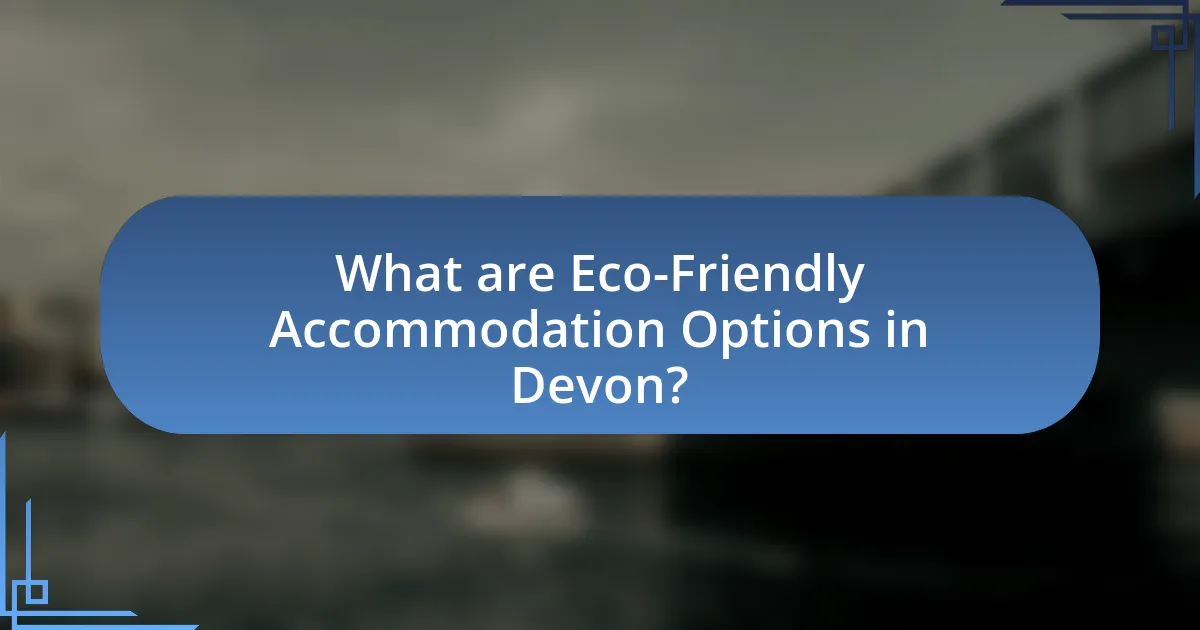Eco-friendly accommodation options in Devon encompass a variety of sustainable choices, including eco-lodges, green hotels, and glamping sites that emphasize environmental responsibility. These accommodations utilize renewable energy sources, implement energy-efficient practices, and prioritize local sourcing to minimize ecological impact. The article explores how eco-friendly options differ from traditional accommodations, the sustainable practices commonly adopted, and the role of Devon’s natural attractions in promoting eco-tourism. Additionally, it highlights the local culture’s support for sustainable tourism initiatives and provides guidance for travelers on selecting and maximizing eco-friendly stays while supporting local communities.

What are Eco-Friendly Accommodation Options in Devon?
Eco-friendly accommodation options in Devon include eco-lodges, sustainable hotels, and glamping sites that prioritize environmental responsibility. For instance, the Green House Hotel in Bournemouth is known for its commitment to sustainability, utilizing renewable energy sources and locally sourced materials. Additionally, eco-lodges like the Eco Retreats in the heart of Devon offer unique stays in nature while minimizing ecological impact through sustainable practices. These accommodations often feature energy-efficient systems, waste reduction initiatives, and organic food sourcing, aligning with the growing demand for environmentally conscious travel options.
How do eco-friendly accommodations differ from traditional options?
Eco-friendly accommodations differ from traditional options primarily in their commitment to sustainability and environmental conservation. These accommodations utilize renewable energy sources, such as solar or wind power, and implement energy-efficient practices, reducing their carbon footprint. For example, a study by the Global Sustainable Tourism Council found that eco-friendly hotels can reduce energy consumption by up to 30% compared to conventional hotels. Additionally, eco-friendly accommodations often prioritize the use of locally sourced materials and organic products, which supports local economies and minimizes transportation emissions. In contrast, traditional accommodations may not prioritize these sustainable practices, leading to higher environmental impacts.
What sustainable practices are commonly implemented in eco-friendly accommodations?
Eco-friendly accommodations commonly implement sustainable practices such as energy efficiency, water conservation, waste reduction, and the use of sustainable materials. Energy efficiency is achieved through the installation of solar panels, energy-efficient lighting, and smart thermostats, which can reduce energy consumption by up to 30%. Water conservation practices include low-flow fixtures and rainwater harvesting systems, which can significantly decrease water usage. Waste reduction is often addressed through recycling programs and composting, with some accommodations aiming for zero waste. Additionally, the use of sustainable materials, such as reclaimed wood and non-toxic paints, supports environmental health and reduces the carbon footprint of the building. These practices not only minimize environmental impact but also enhance the overall guest experience by promoting a commitment to sustainability.
How do eco-friendly accommodations contribute to environmental conservation?
Eco-friendly accommodations contribute to environmental conservation by implementing sustainable practices that reduce resource consumption and minimize waste. These establishments often utilize renewable energy sources, such as solar or wind power, which lowers their carbon footprint. Additionally, they may incorporate water-saving technologies, such as low-flow fixtures, and promote recycling and composting programs, which further decrease landfill contributions. According to a study by the Global Sustainable Tourism Council, eco-friendly accommodations can reduce energy use by up to 30% compared to traditional hotels, demonstrating their significant role in promoting environmental sustainability.
Why is Devon a popular destination for eco-friendly accommodations?
Devon is a popular destination for eco-friendly accommodations due to its commitment to sustainability and the abundance of natural resources. The region boasts numerous eco-lodges, green hotels, and sustainable camping options that prioritize environmental conservation. For instance, many accommodations in Devon utilize renewable energy sources, such as solar panels and wind turbines, and implement water-saving technologies. Additionally, the local government supports eco-tourism initiatives, promoting responsible travel practices that benefit both the environment and the community. This combination of sustainable practices and natural beauty makes Devon an attractive choice for environmentally conscious travelers.
What natural attractions in Devon promote eco-tourism?
Natural attractions in Devon that promote eco-tourism include Dartmoor National Park, Exmoor National Park, and the Jurassic Coast. Dartmoor National Park offers diverse landscapes and habitats, supporting sustainable hiking and wildlife observation. Exmoor National Park features rich biodiversity and encourages eco-friendly activities like cycling and horseback riding. The Jurassic Coast, a UNESCO World Heritage Site, attracts visitors interested in geology and fossil hunting while promoting conservation efforts. These attractions collectively enhance eco-tourism by providing opportunities for responsible outdoor activities that respect the environment.
How does Devon’s local culture support sustainable tourism initiatives?
Devon’s local culture supports sustainable tourism initiatives through its strong emphasis on community engagement and environmental stewardship. Local traditions prioritize the preservation of natural landscapes and promote the use of locally sourced materials, which reduces carbon footprints. For instance, many accommodations in Devon incorporate sustainable practices such as using renewable energy sources and offering organic, locally produced food. This cultural commitment is reflected in initiatives like the Devon Sustainable Tourism Charter, which encourages businesses to adopt eco-friendly practices, thereby fostering a tourism model that respects both the environment and local heritage.

What types of eco-friendly accommodations are available in Devon?
In Devon, eco-friendly accommodations include eco-lodges, glamping sites, and sustainable hotels. Eco-lodges often utilize renewable energy sources, such as solar panels, and are constructed with sustainable materials. Glamping sites provide a luxurious camping experience while minimizing environmental impact, often featuring yurts or safari tents made from eco-friendly materials. Sustainable hotels focus on reducing waste and conserving water, implementing practices like recycling and using locally sourced food. These accommodations cater to environmentally conscious travelers seeking to minimize their carbon footprint while enjoying the natural beauty of Devon.
What are the different categories of eco-friendly accommodations?
The different categories of eco-friendly accommodations include eco-lodges, green hotels, hostels with sustainable practices, bed and breakfasts that prioritize local sourcing, and vacation rentals that adhere to environmentally friendly standards. Eco-lodges are typically built using sustainable materials and often incorporate renewable energy sources. Green hotels implement energy-efficient systems and waste reduction programs. Sustainable hostels focus on community engagement and eco-conscious practices. Bed and breakfasts often emphasize local food sourcing and environmentally friendly amenities. Vacation rentals may feature eco-certifications and promote sustainable tourism practices. These categories collectively contribute to reducing the environmental impact of travel and support local ecosystems.
How do eco-lodges differ from eco-hotels?
Eco-lodges differ from eco-hotels primarily in their design and operational focus. Eco-lodges are typically situated in natural settings and emphasize sustainability through architecture that blends with the environment, often using local materials and renewable energy sources. In contrast, eco-hotels are usually located in urban or suburban areas and focus on sustainable practices within a more conventional hotel framework, such as energy-efficient appliances and waste reduction programs. This distinction is supported by the fact that eco-lodges often provide immersive experiences in nature, while eco-hotels cater to travelers seeking comfort and convenience with an eco-friendly approach.
What unique features do glamping sites offer for eco-conscious travelers?
Glamping sites offer eco-conscious travelers unique features such as sustainable accommodations, which often include yurts, safari tents, or treehouses made from eco-friendly materials. These sites typically utilize renewable energy sources like solar power and promote water conservation through rainwater harvesting systems. Additionally, many glamping locations emphasize local sourcing by providing organic food options and supporting nearby farms, thereby reducing carbon footprints associated with transportation. Research indicates that eco-friendly accommodations can significantly lower environmental impact, with studies showing that sustainable practices in tourism can reduce energy consumption by up to 30%.
What amenities can guests expect in eco-friendly accommodations?
Guests in eco-friendly accommodations can expect amenities such as energy-efficient appliances, water-saving fixtures, organic toiletries, and locally sourced food options. These accommodations often utilize renewable energy sources like solar panels and provide recycling facilities to minimize waste. According to a study by the Global Sustainable Tourism Council, eco-friendly practices not only reduce environmental impact but also enhance guest experiences by promoting health and wellness through natural materials and sustainable design.
How do eco-friendly accommodations ensure comfort while being sustainable?
Eco-friendly accommodations ensure comfort while being sustainable by utilizing energy-efficient technologies, sustainable materials, and eco-conscious practices that enhance guest experience. For instance, many eco-friendly lodgings incorporate renewable energy sources like solar panels, which not only reduce carbon footprints but also provide reliable energy for heating and cooling systems, ensuring a comfortable environment. Additionally, these accommodations often use high-quality, non-toxic materials in their furnishings and decor, promoting health and well-being for guests. Studies show that eco-friendly practices, such as water-saving fixtures and locally sourced food options, contribute to a more enjoyable stay while minimizing environmental impact.
What local products and services are often featured in eco-friendly stays?
Eco-friendly stays often feature local products such as organic food, handmade crafts, and natural toiletries. These accommodations prioritize sourcing ingredients and materials from nearby farms and artisans to reduce carbon footprints and support the local economy. For instance, many eco-friendly lodgings in Devon collaborate with local farmers to provide guests with fresh, seasonal produce, ensuring that meals are both sustainable and delicious. Additionally, services like guided nature walks and workshops led by local experts are commonly offered, enhancing the guest experience while promoting environmental awareness and community engagement.

How can travelers choose the best eco-friendly accommodation in Devon?
Travelers can choose the best eco-friendly accommodation in Devon by researching establishments that have received recognized sustainability certifications, such as the Green Key or Eco-Label. These certifications indicate that the accommodation adheres to strict environmental standards, including energy efficiency, waste reduction, and sustainable sourcing. Additionally, travelers should look for accommodations that utilize renewable energy sources, offer organic or locally sourced food, and implement water conservation practices. Reviews and testimonials from previous guests can also provide insights into the eco-friendly practices of the accommodation, ensuring that travelers make informed choices aligned with their sustainability values.
What criteria should be considered when selecting eco-friendly accommodations?
When selecting eco-friendly accommodations, consider criteria such as sustainability practices, energy efficiency, waste management, and local sourcing. Sustainable practices include the use of renewable energy sources, such as solar or wind power, which significantly reduce carbon footprints. Energy efficiency can be assessed through certifications like LEED or Green Key, indicating adherence to environmental standards. Effective waste management practices, such as recycling programs and composting, demonstrate a commitment to reducing landfill contributions. Additionally, local sourcing of food and materials supports the local economy and minimizes transportation emissions. These criteria ensure that accommodations not only provide comfort but also contribute positively to the environment.
How can travelers verify the sustainability claims of accommodations?
Travelers can verify the sustainability claims of accommodations by checking for recognized certifications such as Green Key or EarthCheck, which require properties to meet specific environmental standards. Additionally, they can review the accommodation’s sustainability practices detailed on their website, including energy efficiency measures, waste management policies, and sourcing of local products. Online reviews and third-party platforms like EcoBnB can also provide insights from previous guests regarding the authenticity of sustainability claims.
What resources are available for finding eco-friendly options in Devon?
Resources for finding eco-friendly options in Devon include websites like Visit Devon, which features a dedicated section for sustainable tourism, and the Green Tourism website, which lists certified eco-friendly accommodations. Additionally, local organizations such as Devon Wildlife Trust provide information on sustainable practices and eco-friendly businesses in the area. These resources ensure travelers can easily identify and choose environmentally responsible options while visiting Devon.
What are some tips for maximizing the eco-friendliness of your stay?
To maximize the eco-friendliness of your stay, choose accommodations that prioritize sustainability, such as those with green certifications like LEED or Green Key. These establishments often implement energy-efficient practices, utilize renewable energy sources, and promote water conservation. Additionally, opt for local and organic food options provided by the accommodation, as this reduces carbon footprints associated with transportation. Engaging in eco-friendly activities, such as biking or hiking instead of driving, further enhances your sustainable experience. Supporting local businesses and using public transportation can also contribute to a lower environmental impact during your stay.
How can guests reduce their environmental impact during their stay?
Guests can reduce their environmental impact during their stay by adopting sustainable practices such as minimizing water usage, recycling waste, and opting for eco-friendly transportation. For instance, guests can take shorter showers and turn off taps while brushing teeth to conserve water, which is crucial in areas where water scarcity is a concern. Additionally, recycling paper, plastics, and glass helps reduce landfill waste, contributing to a cleaner environment. Choosing public transport, biking, or walking instead of using cars decreases carbon emissions, aligning with eco-friendly principles. These actions collectively contribute to a more sustainable travel experience, supporting local conservation efforts and reducing the overall ecological footprint.
What practices can travelers adopt to support local communities while staying in eco-friendly accommodations?
Travelers can support local communities while staying in eco-friendly accommodations by prioritizing local businesses, engaging in cultural experiences, and participating in community initiatives. By choosing to dine at locally-owned restaurants, shop at artisan markets, and hire local guides, travelers directly contribute to the local economy. Engaging in cultural experiences, such as workshops or traditional events, fosters cultural exchange and understanding. Additionally, participating in community initiatives, like beach clean-ups or conservation projects, helps preserve the local environment and strengthens community ties. These practices not only enhance the travel experience but also ensure that the benefits of tourism are shared with the local population.

